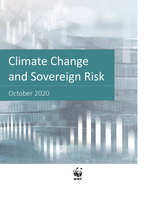External publications

Climate change and sovereign risk
Volz, Ulrich / John Beirne / Natalie Ambrosio Preudhomme / Adrian Fenton / Emilie Mazzacurati / Nuobu Renzhi / Jeanne StampeExternal Publications (2020)
London, Tokyo, Singapore, Berkeley: SOAS University of London, Asian Development Bank Institute, World Wide Fund for Nature Singapore, Four Twenty Seven
DOI: https://doi.org/10.25501/SOAS.00033524
Volltext/Full text
Climate change can have a material impact on sovereign risk through direct and indirect effects on public finances. It raises the cost of capital of climate-vulnerable countries and threatens debt sustainability. Governments must climate-proof their economies and public finances or potentially face an ever-worsening spiral of climate vulnerability and unsustainable debt burdens. This study focuses on the complex nexus between climate change and sovereign risk, identifying and scrutinizing six transmission channels through which climate change can amplify sovereign risk and worsen a sovereign’s standing: (i) Fiscal impacts of climate-related natural disasters; (ii) Fiscal consequences of adaptation and mitigation policies; (iii) Macroeconomic impacts of climate change; (iv) Climate-related risks and financial sector stability; (v) Impacts on international trade and capital flows; and (vi) Impacts on political stability. The transmission channels are not independent of each other. Climate impacts can magnify the transmission of risk through multiple channels. The socioeconomic and fiscal effects of climate change are multifaceted and depend on the policies taken or not taken to mitigate and adapt to these risks. This report illustrates the relevance of the six transmission channels for sovereign risk in Southeast Asia, one of the most climate-vulnerable regions of the world. Physical risks are expected to significantly impact economic activity, international commerce, employment, and public finances with national and regional implications. Transition risks will be prominent as exports and economies become affected by international climate policies, technological change, and changing consumption patterns. The implications of climate change for macrofinancial stability and sovereign risk are likely to be material for most if not all countries in Southeast Asia. The report presents new empirical evidence on the relationship between climate vulnerability, resilience, and the sovereign cost of capital. Using a sample of 40 developed and emerging economies, econometric analysis shows that climate risks and resilience to these risks have significant effects on the cost of sovereign borrowing. Higher climate risk vulnerability leads to significant rises in the cost of sovereign borrowing. Premia on sovereign bond yields amount to around 275 basis points for economies highly exposed to climate risk, compared to 155 basis points for Southeast Asian countries, and 113 basis points for emerging market economies overall. In contrast, exposure to climate risks is not statistically significant for the group of advanced economies. We also find resilience to climate risk to be statistically significant in reducing bond yields across all country groups, but with smaller magnitudes. Overall, the analysis confirms that climate vulnerability has significant implications for sovereign borrowing costs, and that the magnitude of the effect is much larger for countries highly vulnerable to climate change. Impulse response analysis suggests that shocks imposed on climate vulnerability and resilience have permanent effects on bond yields, and that economies highly exposed to climate risks experience larger permanent effects on yields than economies with lower exposure. All branches of government will have to address climate-related risks. Monetary and financial authorities will have to play crucial roles in analyzing and mitigating macrofinancial risks. We recommend five broad policy actions to mitigate and manage climate-related sovereign risk in a coordinated manner.
Contact
Cornelia Hornschild
Publication Coordinator
E-mail Cornelia.Hornschild@idos-research.de
Phone +49 (0)228 94927-135
Fax +49 (0)228 94927-130
Alexandra Fante
Librarian/ Open Access Coordinator
E-Mail Alexandra.Fante@idos-research.de
Telefon +49 (0)228 94927-321
Fax +49 (0)228 94927-130



![[Translate to English:] Photo: Alexandra Fante, Bibliothekarin/Open Access-Koordinatorin](/fileadmin/_processed_/f/0/csm__c_Deutsches-Institut-fuer-Entwicklungspolitik_Fante_94ce4fa1ba.jpg)